Think of this as Volume 14, Number 35 of A-Clue.com, the online newsletter I've written since 1997. Enjoy.
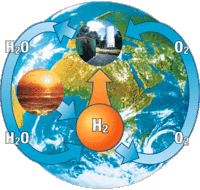
Today's transformation is the move from energy defined by resources to energy defined by devices, by technology.
There is plenty of energy around — from the Sun, from the ground, from the wind, from the air all around us. All we need do is harness and deliver it. This will trnasform all our financial, political and international relationships, so those who depend on the old relationships are fighting back with everything they have.
It's not about mosques or gay marriage or anything else we seem to worry about. All these issues are means to an end. They are pushed by, and products of, the financial strength of the oil power. Follow the money and this becomes obvious.
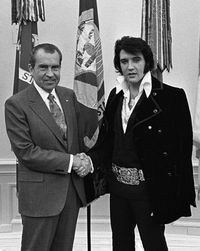
It has always been this way, but a brief review:
- The 1960s saw a switch from a manufacturing-based economy to one based on technology and content.
- The 1930s saw a change from a production-based economy to one based on consumers.
- The 1890s saw a change from a collection of local markets to a single national market.
- The 1850s saw a change from an agrarian economy to one based on manufacturing.
In each of these cases there appeared, on the surface, to be other issues in play. Social issues in the 1960s. Economic issues in the 1930s. Urban and rural problems in the 1890s, and of course the coming Civil War.
But these were, in fact, cover for the economic changes going on beneath the surface. In each case, economic interests who were losing-out to change sought political power in order to secure their position. In the crisis election they lost that power, and they then engaged in a twilight struggle against the new over issues only tangentially-linked to what was, in fact happening.
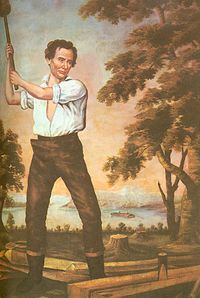
Economically, the current crisis has more in common with that of the 1890s than any other. President Obama comes from Illinois, a manufacturing center, replacing a Texan who based his career on resources. The rising "green" economy will require massive amounts of high-tech manufacturing, and a re-organization of our electrical grid, which was born in the Midwest. A lot of the talent we will need to make this transformation happen comes from the heartland, not from the oilpatch.
The President's biggest mistake in office, by far, is one that is completely hidden from view. That is, his refusal to directly confront the real enemy. Not just the Koch brothers, but the economic interests they represent. We are still subsidizing coal, and oil, and natural gas. The aid we give green manufacuturing pales in comparison. The question and answer are simple, not complex.
Changing our economy's incentives will unleash a flood of capital and millions of jobs. We need an industrial recovery, not a consumer one.
Why delay? One reason is that research is advancing at such a breakneck pace that the solar cells, and solar technologies, that would have made sense two years ago are no longer competitive. We don't yet know what will make the most sense in mass production, which is one reason why the talisman of our age is the windmill. We know what windmills are, and what they look like.
But there are other alternative energy technologies that are mature besides wind. Geothermal technologies are very mature. We know what the new grid has to look like. Insulation is simple, technologically speaking.
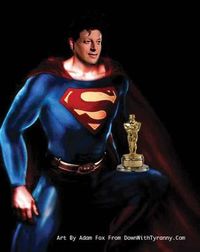
The President is reluctant to make enemies, but in this case we have no choice. Because we do have economic enemies, ruthless ones, and most of them are in this country, not in Iran or Afghanistan. Like America's social conservatives, the Taliban are a symptom of a larger problem, an economic problem, ginned up by existing economic interests in order to regain political power.
There is still time for the President to tell us the truth, and confront our real economic problems. Al Gore has been virtually silent since January 2009. John Doerr has been laying low. Vinod Khosla has been quiet. Or they appear to be. In fact they have been investing, they have been buying, they have been setting the stage for great fortunes. (If Al Gore becomes James Cox, it's no tragedy.)
These men, and thousands of men and women like them, represent the new economy, and it's the promise of that new economy that, once harnessed, will bring us the change we need.


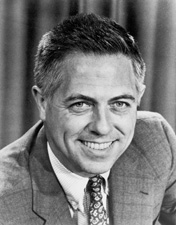








I both learn from and enjoy your essays, Dana, tying a broader view of our history into the challenges we face.
And never shrinking from the work ahead. Thanks.
Also hoping we’ll stay encouraged, I wrote a silly poem awhile ago: “Freedom’s invincible if based on the principal there’s motion from ocean to ocean, reaching and catching, comparing and matching, in faith and with fearing, with sweat and engineering, with diligent facts in solvent pacts; if anyone will share it, let’s base it on merit.”
I both learn from and enjoy your essays, Dana, tying a broader view of our history into the challenges we face.
And never shrinking from the work ahead. Thanks.
Also hoping we’ll stay encouraged, I wrote a silly poem awhile ago: “Freedom’s invincible if based on the principal there’s motion from ocean to ocean, reaching and catching, comparing and matching, in faith and with fearing, with sweat and engineering, with diligent facts in solvent pacts; if anyone will share it, let’s base it on merit.”
Sure. Let’s increase taxes and then wait for the wealth to be created. Next. And don’t play word games. A tax is a tax, under whatever name it is introduced. Taxes increase prices, reduce economic activity, and also have the nasty effect of eventually decreasing the tax base. Historical facts. Proven over and over again.
This was a decent blog though. I didn’t see any hate spewing in your blog today, nor was there the (all-yawn-now) out of place Bush bashing. Good job. Keep it up. Oh, and if you want to find out why spineless Obama hasn’t taken on the vested energy interests, one need look no further than who bankrolled his campaign. Yes. Good ol’ USA is effectively run by corporate interests. And we get stuck with 2 parties that play the game. The sad state of our democracy can be illustrated by the last election. A country – what is it – over million comes up with just McCain and Obama for people to choose from? Sad. Neither is presidential material. Hell, one can’t even prove he’s an American.
By the way, maybe you can explain this. How is that the liberals – even when they’re in power – can’t get anything done? The American people will see them for what they are in November; ineffective and spineless. And the mosque issue will cost them even more. Yes. That’s what you get when you elect a closet muslim president who can’t even prove he’s born on US soil, and who kisses the hands of sheiks, and even bows for them. ‘Presidential material’? Lol – no way. The liberals elected a joker. Interestingly that even hard core leftist media are beginning to doubt The One.
Have a good one. And congrats on a decent blog.
Sure. Let’s increase taxes and then wait for the wealth to be created. Next. And don’t play word games. A tax is a tax, under whatever name it is introduced. Taxes increase prices, reduce economic activity, and also have the nasty effect of eventually decreasing the tax base. Historical facts. Proven over and over again.
This was a decent blog though. I didn’t see any hate spewing in your blog today, nor was there the (all-yawn-now) out of place Bush bashing. Good job. Keep it up. Oh, and if you want to find out why spineless Obama hasn’t taken on the vested energy interests, one need look no further than who bankrolled his campaign. Yes. Good ol’ USA is effectively run by corporate interests. And we get stuck with 2 parties that play the game. The sad state of our democracy can be illustrated by the last election. A country – what is it – over million comes up with just McCain and Obama for people to choose from? Sad. Neither is presidential material. Hell, one can’t even prove he’s an American.
By the way, maybe you can explain this. How is that the liberals – even when they’re in power – can’t get anything done? The American people will see them for what they are in November; ineffective and spineless. And the mosque issue will cost them even more. Yes. That’s what you get when you elect a closet muslim president who can’t even prove he’s born on US soil, and who kisses the hands of sheiks, and even bows for them. ‘Presidential material’? Lol – no way. The liberals elected a joker. Interestingly that even hard core leftist media are beginning to doubt The One.
Have a good one. And congrats on a decent blog.
Thanks. There is a great deal of cackling going on in the right side of the blogosphere these days. But the chicken remains the wisest of God's creatures. She only cackles after the egg is laid.
Dana
Thanks. There is a great deal of cackling going on in the right side of the blogosphere these days. But the chicken remains the wisest of God's creatures. She only cackles after the egg is laid.
Dana